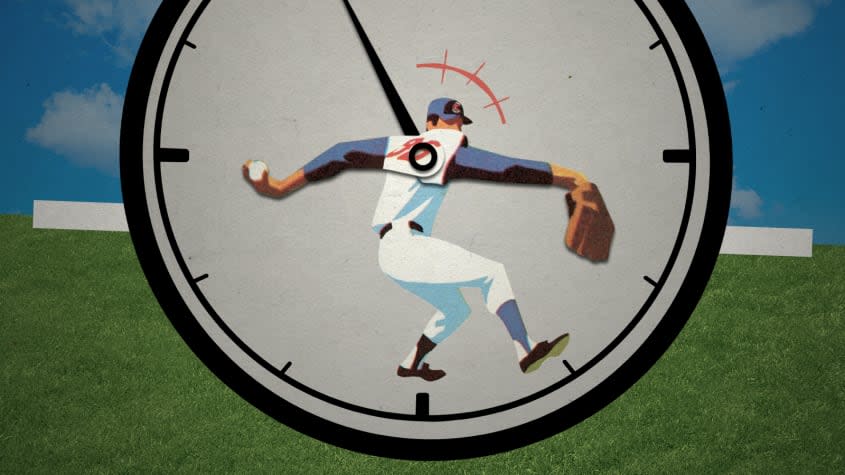Is MLB's pitch clock good for the game, or bad for tradition?

- Oops!Something went wrong.Please try again later.
Just about everybody agrees: Baseball games are too long. But they don't necessarily agree on what to do about it.
Major League Baseball last week approved sweeping new rules that will go into effect for the 2023 season. The bases will get slightly bigger and defensive shifts will no longer be allowed. But the most significant update is the implementation of a pitch clock that will give pitchers a mere 15 seconds — 20 if a runner is on base — between pitches. Fail, and they get charged with a ball. (Hitters who aren't in the box on time will be charged with a strike.)
That should significantly shorten games, which now run more than three hours on average. "It's the fan-friendliest addition to the game of baseball since the introduction of beer," ESPN's Jeff Passan wrote on Twitter. Some major league pitchers, though, vehemently disagree. "I think it's a bunch of crap," Cubs reliever David Robertson said earlier this year. And some fans have appreciated the literally timeless nature of baseball. Putting players on a timer is "the most insidious alteration to the very fabric of baseball's being that has occurred in over a century," Jeffrey May writes for Diario AS.
These are indeed big changes for a tradition-bound game that is usually slow to adopt new ideas. How might the new rules change the character of America's pastime?
Players don't like the new rules, but fans might
MLB player representatives voted against the pitch clock and defensive shift changes. Why? Because "the guys in the majors have thrived under the status quo," Jon Heyman writes at the New York Post. Yes, baseball lovers tend to "go nuts" when the game evolves. But the league's "heart is in the right place" because the rules are designed to give the fans what they want: Shorter games with "more action, and more athleticism." Will they get that? Experiments at the minor league level suggest that while the pitch clock shortens games, batting averages and runs scored have stayed about the same. That could mean "the games will be just as dull, but end more quickly." History says nobody should panic about the new rules. "We hated the wild card, the expanded playoffs, and anything else new, yet none of those changes hurt the game one iota."
The pitch clock is wrong for baseball
"There are a lot of things that happen on the mound that few fans understand," David Gasper wrote in 2019 for Reviewing the Brew, a Milwaukee Brewers blog. It might look like players are "taking their sweet time," but the wait has a purpose. When pitchers and hitters go to work against each other, the contest "is more of a mental battle than it is a physical one." Speeding up the game might put more fatigue on pitchers' arms, and probably won't do much to grow the game anyway. Kids might enjoy elements of the game that can be converted into online memes, but "you can't do anything with a countdown clock." Instead, the result of a time limit will probably just be sloppier play. "The pitch clock will only diminish the product on the field."
Traditionalists should just chill
There's a temptation to believe that MLB has been "unscrupulously ruined in the service of satisfying TV partners and hooking TikTok-obsessed youth," but that's just "your fear of progress talking," Gabe Lacques writes for USA Today. In fact, baseball has problems, and "it certainly can't hurt to try" some new approaches. The bigger bases should make the game more exciting by increasing the odds of success when players try to steal. And the pitch clock has the support of minor league players — the same guys now showing up in the big leagues — who have already played with it. But if the new rules turn out to be no good, they can always be changed. "More likely, this is a starting point, a momentous shift (no pun intended) toward a different and possibly better game."
Will the changes bring the kids back?
"MLB really had no choice" but to make some big changes to the rule book, Paul Newberry writes for The Associated Press. "Many kids have abandoned the game" and fans in the bleachers "look mostly bused in from a retirement home." So it's good that league leaders "took bold steps to address some of the most obvious problems" in the game. The average big league matchup clocks in at more than three hours these days. But in the minors, where the pitch clock is used, the number is nearly 30 minutes shorter. The MLB's attempt to fix itself "might be a little late," however. Attendance is down nearly 6 percent from 2019. And it's not clear the young fans will come back. "It's probably too late to lure back those who've already found better ways to spend their free time."
You may also like
Trump intended to stay in White House despite 2020 loss, new book alleges
Putin allies are starting to complain publicly that his Ukraine war isn't going well

